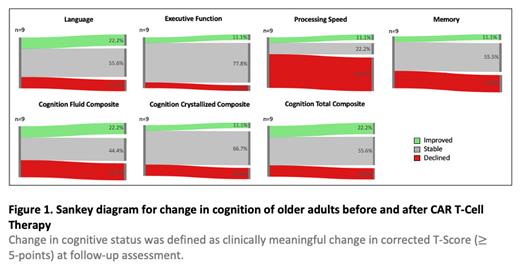Introduction:
Chimeric antigen receptor (CAR) T cell therapy is a transformative therapy that has revolutionized the care of patients with hematologic malignancies. However, CAR-T cell therapy is associated with several short-term toxicities such as cytokine release syndrome (CRS) and immune effector cell-associated neurotoxicity syndrome (ICANS). The impact of CAR-T cell therapy on neurocognitive outcomes is unknown. Here, we report on our prospective study examining the changes in neurocognitive performance before and after CAR T cell therapy.
Methods:
This single-center prospective cohort study recruited consecutive recipients of CAR-T cell therapy enrolled in a prospective study NCT05556928 and a phase II clinical trial NCT04975555. Patients underwent neurocognitive assessment using the NIH Toolbox Cognition Battery (NIHTB-CB). Baseline assessment was done within 3 weeks before receiving CAR-T cell therapy. Follow up assessment was conducted at 90 days of receiving CAR T therapy. Domain specific T-scores adjusted for age, sex, race/ethnicity, and education were calculated. Change in T-scores between pre and post assessments were evaluated, with significant cognitive change defined as +/- 0.5 standard deviations from the mean.
Results:
Twenty-six eligible patients were identified, of which 9 completed both pre and post assessments. The median age was 66 years (range 45-79) at the time of CAR T cell therapy with 76.9% males and 38.5% being Non-Hispanic Black. Cancer types included diffuse large B-cell lymphoma (46.2%), multiple myeloma (38.5%), and follicular lymphoma (11.5%). Our baseline cognitive assessment showed that our eligible patient cohort had a median total composite T-score of 42 (range 30-64); twelve (46%) patients were one or more standard deviations below the mean. Of the 9 patients that completed a follow up assessment, a decline in one or more cognitive domains was seen in 89% of patients. Largest declines were seen in the cognitive domain of processing speed (66.7%, Figure 1).
Conclusion:
CAR T cell therapy recipients experienced a short-term cognitive decline in multiple domains. These findings can be used to educate future patients on potential toxicities of CAR T-cell therapy. We continue to enroll participants into our study and updated data will be presented at the meeting.
Disclosures
Giri:Carevive Systems: Research Funding; Sanofi: Research Funding; Pack Health: Research Funding; OncLive: Honoraria; CareVive: Honoraria. Bal:Janssen: Consultancy; Adaptive Biotechnology: Consultancy; Amyloid Foundation: Research Funding; Bristol Myers Squibb: Consultancy; MJH Lifesciences: Other: Educational content development ; Beigene: Research Funding; Astrazeneca: Consultancy; AbbVie: Consultancy; Fate Therapeutics: Research Funding. Costa:Amgen: Consultancy, Honoraria, Research Funding; Genentech: Research Funding; Janssen: Consultancy, Honoraria, Research Funding; Pfizer: Consultancy, Honoraria; AbbVie: Honoraria, Research Funding; Adaptive biotechnologies: Consultancy, Honoraria; BMS: Consultancy, Honoraria, Research Funding. Narkhede:Genentech, Inc. / F. Hoffmann-La Roche Ltd, Gilead, T.G Therapeutics, Kite, Beigene, EUSA, ADC Therapeutics, Adaptive: Research Funding; Genentech, Inc. / F. Hoffmann-La Roche Ltd, ADC Therapeutics, KITE, Abbvie: Honoraria; Genentech, Inc. / F. Hoffmann-La Roche Ltd: Speakers Bureau.


This feature is available to Subscribers Only
Sign In or Create an Account Close Modal